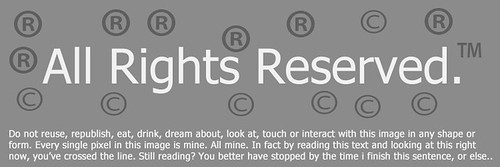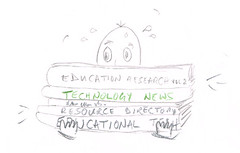In his newsletter OLDaily, Stephen Downes has drawn attention to a blog post by Paul Bradshaw, entitled “The Great British Bake Off copyright grab: We can use your #ExtraSlice Twitter images but not give you credit”. The article describes how the BBC’s terms and conditions state that by submitting material using the #ExtraSlice hashtag you agree to allow the BBC to do whatever they like with it, without bothering to give you credit. Downes comments that:
“It's almost certainly not legal, but who is going to stop them?”
Well, I’m no lawyer, but it strikes me that if you voluntarily submit material in, it is implicitly assumed, full knowledge of the terms and conditions, there’s nothing illegal about it. But it’s kinda irrelevant anyway. As Downes himself says, “Who’s going to stop them?”.
 Possibly slightly too draconian! Creative Commons is a good way to allow others to use your stuff but still retain your rights in it. Photo credit: "All rights reserved" by Sean MacEntee https://www.flickr.com/photos/smemon/
Possibly slightly too draconian! Creative Commons is a good way to allow others to use your stuff but still retain your rights in it. Photo credit: "All rights reserved" by Sean MacEntee https://www.flickr.com/photos/smemon/
In fact, while it’s good that Bradshaw and Downes have drawn attention to this, it is nothing new. I wrote about it nine years ago in the context of a photography competition run by a British newspaper. See Fame or Fortune? and Fame or Fortune (Revisited). There are many websites, and especially competitions, which state that by submitting material to them you agree to:
- Give up your copyright or, what amounts to the same thing in effect, grant them a licence to use the material however they like, forever;
- Give up your moral rights in the work, ie they can use it without acknowledging you as the creator of it; that means that even if you think “Well, the publicity will be useful even though I’m not getting paid for it”, you’re in for a bit of a rude awakening because you may not get any publicity at all;
- You agree that if someone takes offence at the material, you indemnify the organisation, ie if the newspaper, website, competition organisers or whatever are sued, you’re the one paying the costs;
- Some even go so far as to say that they may not use the material now, but you agree that they can use it any time they like in the future.
Anyone who knowingly submits anything under these sorts of terms is, frankly, insane.
Four years ago I summarised the main issues in an article entitled 11 Essential Elements of a Digital Financial Literacy Course. I didn’t mention moral rights by name, but it’s implicit in the sentence “[…] I would argue that if you are going to write for no money, make sure you get something out of it, such as a plug for your website or blog.” At least one of the links in that article is now defunct, thanks to the current Government’s decision to hide archive everything that was useful but which existed before it did. Nevertheless, the general points still stand, and I think parents, teachers and kids should resist the dubious attraction of “15 minutes of fame” in exchange for giving up all their rights in a piece of work (and therefore any potential income from it), forever.
 Your newsletter editor is hard at work doing research for Digital Education, the free newsletter for education professionals. Have you subscribed yet?
Your newsletter editor is hard at work doing research for Digital Education, the free newsletter for education professionals. Have you subscribed yet?
Read more about it, and subscribe, on the Newsletter page of the ICT in Education website.
We use a double opt-in system, and you won’t get spammed.
